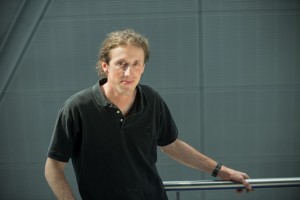Gaël Varoquaux, chercheur à Inria, a animé un séminaire le 19 mars prochain de 14h à 15h, à Nano-INNOV (bât 862, amphi 34), sur le thème « From flop to success in academic software development ».
Résumé [en anglais]
Most lines of code written by programmers in academia never reach an audience. I believe that the cause of this problem is not that academic programmers are incompetent, but more an overall difficulty of defining goals and managing complexity.
I will summarize what I have learned leading several scientific software projects to wide success, such as Mayavi, joblib, scikit-learn: what are the choices that make a successful project? How to organize a community of productive developers that move together? How to build viable scientific code?
Biographie [en anglais]
 Gaël Varoquaux is a computer-science researcher at Inria. His research develops statistical learning tools for functional neuroimaging data with application to cognitive mapping of the brain as well as the study of brain pathologies. In addition, he is heavily invested in software development for science, and wants to make leading-edge algorithmic and statistical tools developed in computer science available across new fields. He project-lead for scikit-learn, one of the reference machine-learning toolboxes, and on joblib, Mayavi, and nilearn. Varoquaux is a nominated member of the Python Software Fundation, and the director of the LearnClues laboratory. He has a PhD in quantum physics and is a graduate from Ecole Normale Superieure, Paris.
Gaël Varoquaux is a computer-science researcher at Inria. His research develops statistical learning tools for functional neuroimaging data with application to cognitive mapping of the brain as well as the study of brain pathologies. In addition, he is heavily invested in software development for science, and wants to make leading-edge algorithmic and statistical tools developed in computer science available across new fields. He project-lead for scikit-learn, one of the reference machine-learning toolboxes, and on joblib, Mayavi, and nilearn. Varoquaux is a nominated member of the Python Software Fundation, and the director of the LearnClues laboratory. He has a PhD in quantum physics and is a graduate from Ecole Normale Superieure, Paris.
Aller plus loin
© Inria / Photo H. Raguet



